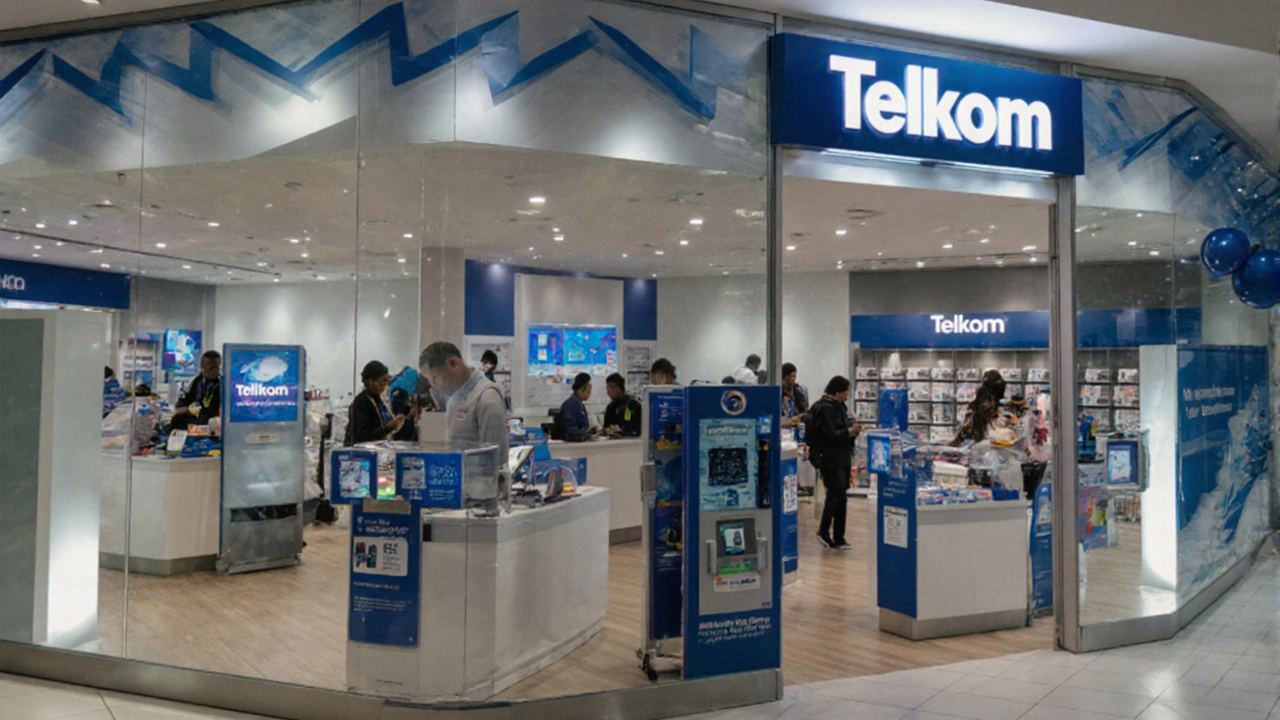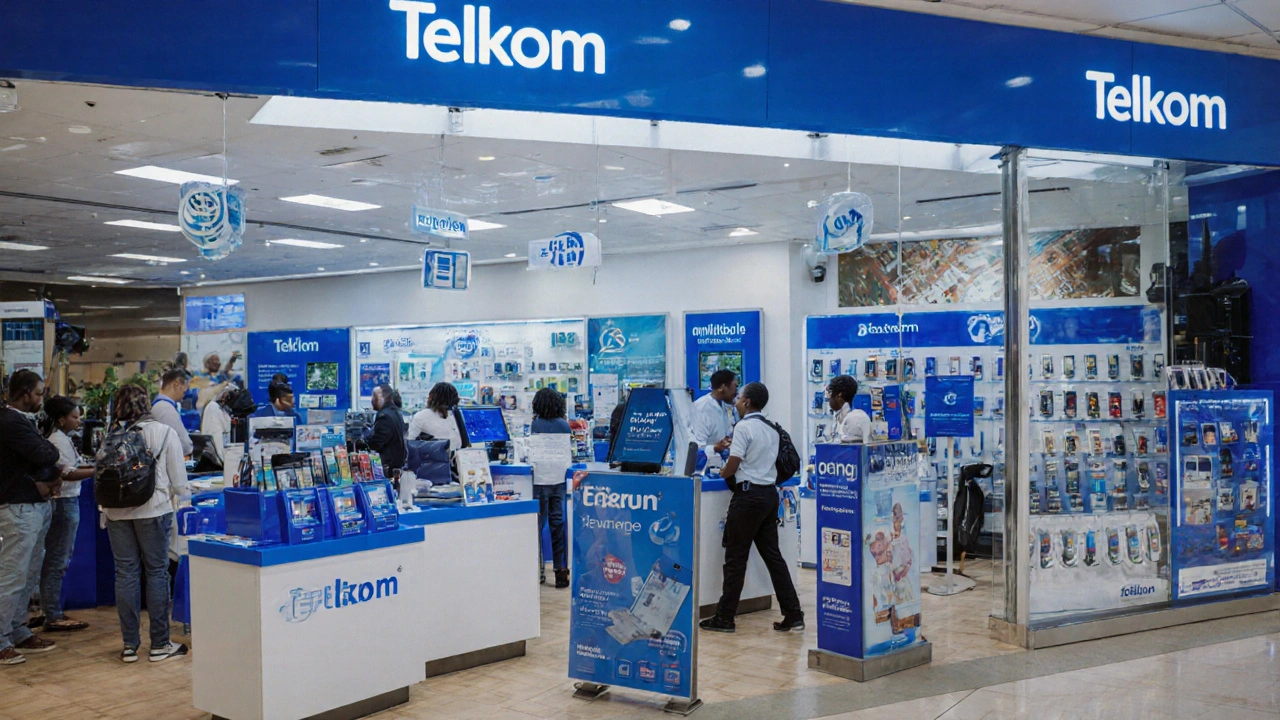Why Telkom South Africa’s valuation has nosedived
When you look at the numbers, the story reads like a cautionary tale. In June 2019, Telkom South Africa boasted a market capitalisation of about R37.2 billion – roughly $2 billion at the time. Fast‑forward to May 2025, and that figure has slumped to R19.4 billion, barely over $1 billion. That’s a loss of R18 billion, or nearly 50 % of the company’s value, in just six years.
What makes the drop even more striking is that it follows a series of earlier crashes. After reaching a peak in 2007, Telkom’s market cap fell to R4.65 billion by mid‑2012. The steepest slide happened between 2008 and 2009, when the valuation plunged from R32.6 billion to R8.79 billion. Those years were marked by a frantic attempt to keep Telkom Media alive – the firm sold its 75 % stake in that unit to Shenzhen Media, a move that barely slowed the bleed.
Today, the company’s standing in the South African telecom market feels tenuous. Competition from mobile‑centric players, pressure on fixed‑line revenues, and the rise of over‑the‑top (OTT) services have all eroded traditional profit streams. Yet the biggest blow isn’t the market’s evolution; it’s a strategic choice made more than a decade ago.

The costly Vodacom divestment
Back in 2008, Telkom sold a 15 % stake in Vodacom to Vodafone for R22.5 billion and handed the remaining 35 % to its shareholders. At the time, the deal seemed logical – it raised cash and reduced exposure to a fast‑growing mobile operator. Fast‑forward to the present day, that 15 % slice would be worth roughly R42 billion, more than double Telkom’s entire market cap.
Even more startling is the missed opportunity of keeping the full 50 % stake. Based on current market prices, that half‑share would be valued at about R140 billion, translating to roughly $7.5 billion. In other words, if Telkom had held onto its Vodacom holding, it could have out‑sized its own market value by a factor of seven.
The Vodacom saga is more than a numbers game; it illustrates how short‑term cash grabs can cripple long‑term growth. By relinquishing ownership, Telkom also gave up a seat at the table of South Africa’s most successful mobile carrier, missing out on strategic synergies, cross‑selling opportunities, and dividend streams that could have steadied its balance sheet.
Industry watchers say the lesson is clear: telecom firms need to think beyond immediate cash needs. The sector is capital‑intensive, and stakes in high‑growth mobile assets often become the engine of future earnings. When a company sells that engine, it risks becoming a passenger on a shrinking road.
Telkom’s current challenges also reflect broader trends in the telecom world. Fixed‑line services, once the backbone of revenue, are shrinking as consumers shift to wireless and fibre. Meanwhile, the regulatory environment in South Africa adds another layer of complexity, with price caps and spectrum allocations influencing profitability.
Investors are now wrestling with a stark reality: the company’s core business is under pressure, and the strategic misstep of 2008 continues to haunt the balance sheet. Some analysts suggest that a renewed focus on high‑margin data services, partnerships with content providers, and a possible re‑entry into mobile infrastructure could help reverse the slump.
For now, Telkom’s market value sits at roughly half what it was six years ago, a vivid reminder that the decisions made in boardrooms can echo for decades. Whether the firm can reinvent itself or remain a shadow of its former self will depend on how aggressively it adapts to the digital age and whether it can recover the strategic vision lost with its Vodacom stake.

manoj jadhav
September 26, 2025 AT 02:07Wow, what a roller‑coaster for Telcos!!!
saurav kumar
September 29, 2025 AT 21:19Telkom’s decline is a stark reminder that short‑term cash grabs can hurt long‑term value. It’s sad to see the missed opportunity.
Ashish Kumar
October 3, 2025 AT 16:31The narrative surrounding Telkom South Africa is not merely a tale of market fluctuations; it is an indictment of strategic myopia that reverberates across the continent’s telecom sector. In 2008, the decision to divest a mere fifteen percent of Vodacom for immediate liquidity seemed prudent, yet the long‑term repercussions were grossly underestimated. The valuation of that stake today, potentially exceeding R42 billion, dwarfs the entirety of Telkom’s current market cap, exposing a glaring miscalculation. Moreover, the choice to forego the remaining thirty‑five percent has compounded the loss, effectively erasing an asset that could now rival – if not surpass – Telkom’s own valuation by a factor of seven. This oversight underscores a broader pattern within corporate governance where short‑term financial engineering eclipses sustainable growth. The telecom industry, characterized by capital intensity, thrives on strategic holdings that generate synergistic revenue streams; relinquishing such a pivotal asset is tantamount to dismantling one’s own engine while hoping to coast on the road. Fixed‑line revenues, once the bedrock of Telkom’s earnings, have eroded under the assault of mobile‑first consumers, further amplifying the need for diversified, high‑margin data services. The regulatory landscape in South Africa, with its price caps and spectrum allocations, adds another layer of complexity that demands agile adaptation. Analysts now argue for a renaissance focused on data‑centric offerings, content partnerships, and perhaps a re‑entry into mobile infrastructure to recapture lost momentum. However, the stigma of past missteps lingers, casting doubt on the firm’s capacity to execute a bold turnaround. The market’s reaction-halving the company’s valuation over six years-serves as a cautionary exemplar for other incumbents contemplating similar asset sales. In essence, the Telkom saga illustrates that strategic patience, rather than fleeting liquidity, remains the cornerstone of enduring corporate resilience.
Pinki Bhatia
October 7, 2025 AT 11:43I feel for the employees who have watched the company’s fortunes wane. It’s tough when a firm’s strategic choices ripple down to the workforce, affecting morale and job security.
NARESH KUMAR
October 11, 2025 AT 06:55Telkom’s story is like a cautionary fable 📖-sell the goose to get the golden egg, then watch the hen disappear! 🙈
Purna Chandra
October 15, 2025 AT 02:07One cannot help but observe the grandiloquent folly exhibited by Telkom’s boardroom; a veritable ballet of shortsightedness, pirouetting away from an asset that could have cemented their dominion in the telecom arena. The abdication of such a strategic lever is nothing short of an intellectual dereliction.
Mohamed Rafi Mohamed Ansari
October 18, 2025 AT 21:19From a financial‑analysis perspective, the pro‑forma impact of retaining the Vodacom stake would have dramatically altered the enterprise’s leverage ratios, potentially improving both creditworthiness and investor confidence.
अभिषेख भदौरिया
October 22, 2025 AT 16:31In the grand tapestry of corporate evolution, Telkom’s decisions serve as a reminder that the pursuit of immediate liquidity often eclipses the wisdom of long‑term stewardship.
Nathan Ryu
October 26, 2025 AT 10:43The market’s harsh verdict on Telkom underlines a fundamental truth: strategic divestments must be weighed against future growth corridors, not merely current balance‑sheet pressures.
Atul Zalavadiya
October 30, 2025 AT 05:55I concur with the earlier analysis; the erosion of fixed‑line revenue streams has rendered Telkom vulnerable, and reclaiming a foothold in mobile infrastructure could serve as a catalyst for revival.
Amol Rane
November 3, 2025 AT 01:07The corporate misstep is evident, yet framing it as a simple ‘error’ neglects the complex interplay of market forces and governance dynamics.
Venkatesh nayak
November 6, 2025 AT 20:19Telkom needs a strategic overhaul – perhaps a joint venture with a local carrier? :)
rao saddam
November 10, 2025 AT 15:31Honestly, this is exactly why I’m fed up with “short‑termism” in corporate boards!!! Let them think ahead!!!
Prince Fajardo
November 14, 2025 AT 10:43Sure, sell the golden goose, then wonder why you can’t make scrambled eggs without a bird. Classic.
Subhashree Das
November 18, 2025 AT 05:55Telkom’s downfall is a textbook case of neglected strategic assets.
jitendra vishwakarma
November 22, 2025 AT 01:07Interesting read – maybe they’ll rethink their approach in the next quarter.